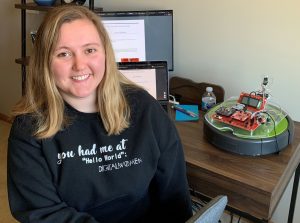
In a normal semester, Iowa State University’s Introduction to Embedded Systems course in the Department of Electrical and Computer Engineering (ECpE) features a popular project simulating exploration of the surface of the planet Mars, using iRobot Roomba-based mobile robots fitted with microcontrollers, nicknamed CyBots, after Iowa State’s mascot Cy.
The CyBot platform is an embedded systems platform – a programmable mobile system composed of various sensors for solving embedded systems problems. In this course, the platform is used to develop a prototype of a Mars Rover that can avoid obstacles, collect data about the Martian terrain, stay within a radiation safe zone and navigate to a communication relay station to send findings back to Earth.
As part of the course, students learn basic computer concepts and interact with the “real world” using CyBots. Students control the movement of CyBots and gather information using various sensors, including sonar and infrared, mounted on a servomotor (also part of the CyBot), to sweep from 0-180 degrees in a room.
In mid-March 2020, Iowa State announced that classes would be moving online after spring break. Converting a hands-on course and lab with 220 students and 10 lab sections to an online format in such a short amount of time was not easy.
“We came up with the idea for each TA to take a CyBot home and modify the lab deliverables, so even though students weren’t getting the hands-on experience of seeing it and working with the CyBot in the lab, they were still able to learn the material and get some of the same team experiences and development practices as they would have from the lab,” said former TA and recent graduate Lindsey Sleeth.
“In the spring, the labs continued to use the physical CyBots, since they were halfway through the semester when courses went virtual. With support from ECpE’s Electronics Technology Group (ETG), the TAs took the CyBots home at spring break, and students worked with TAs the rest of the semester to run code on the robots,” said ECpE University Professor Diane Rover, the spring course instructor. “It was not ideal, but it provided a path to support labs to finish the semester.”
In the summer and fall 2020 semesters, ECpE Associate Professor Phillip Jones was the instructor for the course, which transitioned to be entirely online, and students and TAs interacted through synchronous, scheduled lab periods. ETG replaced the physical CyBots with a simulated robot and emulated I/O interfaces – actual hardware was remotely accessed by students through a virtual desktop, and students were able to program and navigate virtual robots from home.
The simulated CyBot hardware was designed and implemented by a senior design team of then-students Sam Rai, Jacob Aspinall, Isaac Klein, Nathan Nordling, Geonhee Cho and Jisoo Han. Aspinall, working under Jones’ supervision, developed the graphical user interface for the CyBot simulation, which is a key component for running the labs remotely. The combined work of the team and Aspinall’s interface resulted in a product that ETG could take from a prototype into instructional lab use.
“The results of this summer were way better than Dr. Jones and I expected,” said ECpE Engineer Matthew Post, who led ETG on the project. “During our validation testing, we only discovered a few minor bugs and no major issues. The feedback from the students was that things went better than normal due to the lack of real-world challenges that come with interfacing with hardware and software. We have a lot of hope for the future of this project, such as remote access to the labs and the ability to simulate code on the hardware, which can prevent programming errors that might cause damage to our physical platform.”
Both Rover and Jones were honored with the Spring 2020 Teaching Innovation Award from the Iowa State University Office of the Senior Vice President and Provost in recognition of their work and innovation with this course.
“The award reflects that we successfully focused our efforts on student needs and learning,” Rover said. “Our TAs did double duty as both students and teachers with virtual instruction. They were sometimes the glue keeping students engaged. We used the power of our team approach to innovate.”
The embedded systems course is part of a National Science Foundation project entitled, “Reinventing the Instructional and Departmental Enterprise (RIDE).” The goal of the program is to reshape core technical ECpE curricula through pedagogical approaches that promote design thinking, systems thinking and professional skills, such as leadership and inclusion. The program also aims to contextualize course concepts, as well as stimulate creative, socio-technical minded development of ECpE technologies for future smart systems.
ECpE Professor and Palmer Department Chair Ashfaq Khokhar said, “This award truly recognizes the team effort that Diane and Phillip have put together, along with support from ETG. Thank you all for your leadership and efforts, and heartiest congrats to Phillip and Diane on this truly deserving recognition!”